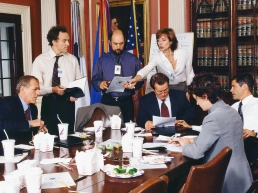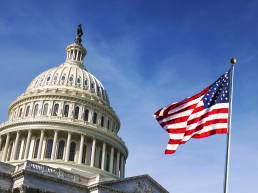Despite the 3,700 kilometers and three time zones that separate Washington D.C. and Los Angeles, the political and entertainment capital have been natural partners in the production of some of cinema’s greatest masterpieces. In this election season we leave you with some movie recommendations for political junkies who want to warm up engines for November.
MR. SMITH GOES TO WASHINGTON (1939)
It’s hard to run through the list of Frank Capra movies and choose one masterpiece over another, but Mr. Smith Goes To Washington will surely be at the top of the best movies of all time about politics. This classic focuses on a simple man from the interior of the United States who is taken to Washington D.C. by the hands of the party apparatus to fill a seat in the Senate, in the hope that he will be a puppet in the service of dark powers. When Jefferson Smith (played by James Stewart) realizes what is going on, he fights to defend his good name and the institution against corruption. Among the film’s memorable scenes is a long filibuster, in which Mr. Smith speaks for hours to prevent the passage of a law.
THE MANCHURIAN CANDIDATE (1962)
A haunting “political-fiction” film, which reflects the conspiratorial paranoia and cold war climate of the early 1960s (it is the time of the Cuban Missile Crisis), which is also Frankenheimer’s best film and which gave Frank Sinatra one of the greatest dramatic roles of his career. Adapted from a novel by Richard Condon about a prisoner of the Korean War, who returns after being brainwashed and becomes instrumental in an assassination attempt on a presidential candidate. This is a film that breathes politics, and with a masterful performance by Angela Lansbury, who plays the role of the candidate’s mother who seeks to disrupt the political process through violence.
DR. STRANGELOVE OR: HOW I LEARNED TO STOP WORRYING AND LOVE THE BOMB (1964)
Considered one of the best black comedies of all time, the funniest film about the nuclear age and one of Stanley Kubrick’s masterpieces, it is full of memorable performances, which are integrated into a scenario of insanity barely contained in this comedy of deception illuminated by satirical scenes. The story begins when General Jack D. Ripper (Sterling Hayden) – who commands the Burpelson Air Force Base – obsessed with the idea that the Communists are trying to steal Americans’ “precious bodily fluids”, goes into total madness and orders an immediate attack on the Soviet Union. The President of the United States (Peter Sellers) reunites, in desperation, with his advisors, who include General Buck Turgidson (George C. Scott) and ex-Nazi scientist Dr. Strange Love (also played by Peter Sellers). They see no other solution than to let the Soviets shoot down the American bombers, which is an “acceptable loss” for the statistics. Meanwhile, the Soviet ambassador (Peter Bull) informs them that the USSR possesses a “Doomsday Device” – a device about to drop nuclear bombs as soon as they are attacked.
ALL THE PRESIDENT’S MEN (1976)
The President’s Men is one of the most famous political films and one that marked a generation. The film portrays the investigation of the journalist duo Bob Woodward (Robert Redford) and Carl Bernstein (Dustin Hoffman) into the Watergate affair for the Washington Post, in what is simultaneously one of the most important and consequential journalistic investigations, and one of the biggest scandals in American politics. After the disclosure of the evidence of political espionage – in particular his own recordings in the Oval Office – and faced with the risk of being impeached, President Richard Nixon resigned and gave way to his vice president, Gerald Ford. It’s one of the milestones in the history of American politics, a masterpiece of journalism — about the best and worst of the profession (and coined the phrase “follow the money” that was never uttered by Deep Throat, nor written by Bob Woodward or Carl Bernstein).
THE AMERICAN PRESIDENT (1995)
Andrew Shepherd (Michael Douglas) is elected President of the United States after being widowed. Three years later, always at the helm of the White House, the head of state feels the need to start dating again. It is at this time that the beautiful Sydney Ellen Wade (Annette Bening) enters the scene, the perfect candidate for First Lady, if there is no small drawback: belonging to a strong environmental “lobby” that disagrees with some of the President’s policies. It is one of the first films to depict the genius of Aaron Sorkin’s writing, in what appears to be the warm-up for his television masterpiece, the series “The West Wing”.
WAG THE DOG (1997)
Adapted from David Mamet’s book of the same name, “Maneuvers in the White House,” it presents a critical view of the presidency and the puritanical anti-Clinton campaigns. With less than two weeks to go before the elections, a scandal threatens the president’s bid for a second term. But before the incident can cause irreversible damage, a mysterious man is called to the White House to solve the problem. The man is Conrad Brean (Robert DeNiro), whose profession is to manipulate the press and, through it, the American people. Brean manages to divert attention from the president’s scandal to a more important story: a war. With the help of Stanley Motss (Dustin Hoffman), a famous Hollywood producer, and his team, Brean assembles a unique crisis team that will orchestrate a global conflict unlike any you’ve ever seen on CNN. Dustin Hoffman was nominated in the Best Actor category at the 1998 Academy Awards.
FROST/NIXON (2008)
Another portrait of what is one of the most remarkable periods in the history of the Presidency of the United States, which transforms into a historical drama the story behind the interviews given in 1977 by Richard Nixon to the British journalist David Frost. In a troubled period following the resignation of the President, Richard Nixon sees these interviews as an opportunity to revive his political career, but Frost, dissatisfied, fights for a confession of the then U.S. President’s involvement in the Watergate scandal.
THE IDES OF MARCH (2011)
Stephen Meyers (Ryan Gosling) is the campaign adviser to Governor Mike Morris (George Clooney), who is preparing for the U.S. presidential race. Determined to win who he sincerely believes to be the best representative of his country, Stephen is fully committed to that campaign. However, given the manipulation and artifices that multiply around him, man will have to face reality coldly and change his way of seeing men and their work. Between what is morally right and what is actually expected of him, he will find himself in a game he wishes he had never entered. Directed by George Clooney, it is the adaptation of the play Farragut North, written in 2008 by Beau Willimon, based on the 2004 in-person campaign of US Democrat Howard Dean. The film’s title is an allusion to March 15 of the Roman calendar, the day Julius Caesar was assassinated by a group of conspirators in the year 44 BC.
LINCOLN (2012)
Abraham Lincoln was born on February 12, 1809, in Washington, D.C. Leading an unstable nation through the difficult period of the American Civil War, he was a determined man with precise ideas about governance, something he demonstrated from his election in 1860 until his assassination in April 1865. Directed by Steven Spielberg and starring Daniel Day-Lewis, this is the film adaptation of the 2005 film “Team of Rivals: The Political Genius of Abraham Lincoln” written by Doris Kearns Goodwin. More than a biography, this film is an example of Lincoln’s political genius as a political strategist, of the complexity and dark side of the legislative process – the compromises, the threats and the corruption – when in the last four months of his life he dedicated himself to the approval by the House of Representatives of the 13th Amendment to the American Constitution. which resulted in one of the most important social transformations in the United States: the abolition of slavery.
LBJ (2016)
A member of the Texas Democratic Party, Lyndon B. Johnson (1908-1973) served in the House of Representatives from 1937 to 1949 and the Senate from 1949 to 1961. In the 1960 presidential race, after losing the Democratic primary, he accepted John F. Kennedy’s offer to be his vice president. In 1963, after Kennedy’s assassination, Johnson eventually took power, becoming the 36th President of the United States. With the country mourning the loss of the head of state, Johnson is forced to honor Kennedy’s legacy, especially by instituting the historic Civil Rights Act, which finally ended several systems of racial segregation in the US. Despite all the difficulties, the way he served his citizens earned him re-election on November 3, 1964, with one of the most impressive results ever over Barry Goldwater, the Republican opponent. During the first years of his government, the economy grew, with thousands of people lifted out of poverty due to his economic and social actions. Later, as the U.S. increased participation in the Vietnam War, it lost popularity, which led it to drop out of the presidential race in 1968. LBJ is a drama about the political upheaval that Lyndon B. Johnson faced when he was placed in the presidency after Kennedy’s assassination.
VICE (2018)
Vice (2018), is a biographical drama about Dick Cheney, George W. Bush’s vice president, about his journey in politics, from interning in Congress, through his partnership with Donald Rumsfeld, his years as Gerald Ford’s chief of staff, and his rise to the positions where he wielded more power – Secretary of Defense in 1989 and Vice President in 2001. It’s a film about political ambition, about the dark side of American politics, and about some of the most important decisions in American politics – and with an impact on the whole world – such as the Iraq war.
Related Posts
23 de May, 2024
POINT OF VIEW: New Youth Contest to Reward Essays on U.S. Elections
Young people between the ages of 18 and…



